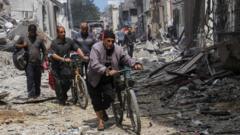Witnesses report that a series of Israeli air raids resulted in extensive displacement within Gaza City, leading to casualties and increasing calls for ceasefire efforts amid mounting humanitarian challenges.
Displacement and Despair: Israeli Air Strikes Spark Humanitarian Crisis in Gaza

Displacement and Despair: Israeli Air Strikes Spark Humanitarian Crisis in Gaza
Recent Israeli air strikes have led to the displacement of hundreds of families in the Gaza Strip, raising concerns over a worsening humanitarian crisis.
In a devastating series of air strikes across the Gaza Strip, Israeli military actions have reportedly forced hundreds of Palestinian families to flee their homes, compounding the already dire humanitarian situation in the region. Eyewitness accounts indicate that residents were caught off guard by the intensity of the attacks, which targeted densely populated neighborhoods such as Shujaiya, Tuffah, and Zeitoun. Local rescue teams have confirmed the recovery of five deceased individuals, alongside numerous injuries necessitating urgent medical attention at Al-Ahli Hospital in Gaza City.
The escalation comes after one of the most extensive evacuation orders since the conflict resumed in March, as the Israel Defense Forces (IDF) urged civilians to evacuate various northern Gaza areas ahead of further bombardments. However, many families, like that of Abeer Talba—a mother of seven—ignored the directive to move south, opting instead to seek refuge within Gaza City. "We had no choice but to leave everything behind," Talba lamented, detailing their plight as they faced starvation and homelessness.
Activists have shared harrowing videos, depicting the chaos and destruction in the aftermath of the bombings, which included a reported strike on a school sheltering displaced families in Zeitoun. As fears mount over the potential expansion of Israel’s ground offensive, there is speculation among Israeli military analysts that some senior officers are nearing the conclusion that their objectives in Gaza are nearing success. However, many former military leaders caution against a prolonged conflict, suggesting that a shift to guerrilla-style warfare could result in further losses among civilians and soldiers alike.
Amid growing domestic and international pressure, Prime Minister Benjamin Netanyahu's decisions are under scrutiny, as calls for a renewed ceasefire gain momentum. His historical inclination towards military action stands at odds with an urgent need for diplomatic solutions as the humanitarian crisis reaches critical levels.



















